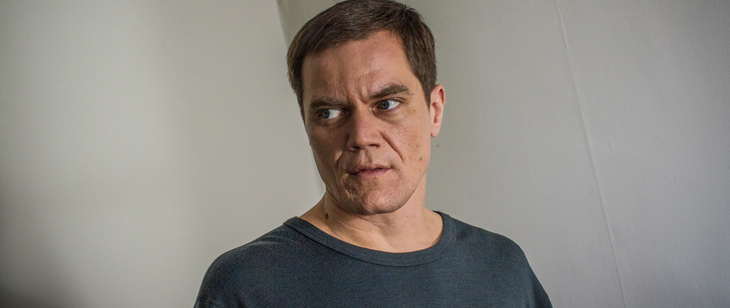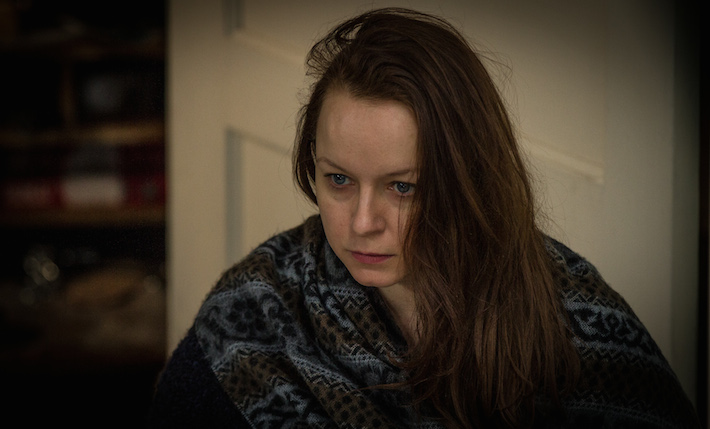
The Harvest
Written by Stephen Lancellotti
Directed by John McNaughton
USA, 2013
The Harvest is a modern gothic horror set in small-town America. On one hand embracing the mythology and horror of gothic sensibilities, the film also utilizes naturalism to create a sense of comfort and to help root emotions in reality. Katherine (Samantha Morton) and Richard (Michael Shannon) are a married couple caring for an ailing son, Andy (Charlie Tahan). Their apparent familial bliss is disrupted by the arrival of a pre-adolescent neighbor, Maryann (Natasha Calis). While Maryann’s intentions are nothing but cordial, the couple is wary of her curiosity, and tensions rise as she continually subverts their desires to stay away from their home. Maryann’s quest for truth and Andy’s friendship unravels a dark stain on the American family.
Illness is the central catalyst for the film’s tension as Andy’s sickness has become the focus of his parent’s relationship. The opening scenes, in particular, establish how the dynamic of their relationship has shifted due to having to care for Andy. Katherine is a doctor and Richard used to be a nurse (before he was forced to quit his job to care for Andy full time), and she uses her position of superiority to crush Richard whenever possible. Richard never knows enough, he can never care enough, and he cannot possibly understand her treatment plan. Andy’s illness has put a wedge between the couple that is irreparable, but it is also what is keeping them together.
The Harvest is not just a family drama, however, and the film quickly descends into gothic darkness. Instead of castles and manors, we have the storied homes of New York in the fall. Much of the film’s success comes from the art direction, in particular as it surrounds Andy’s literally crippled identity as the quintessential American boy. His room is decorated with light blue wallpaper with baseball players, is adorned with collector’s items (Maryann observes that if they were really collector’s items, he should have kept them in their original packaging), and he has an Xbox. The only games Andy is ever allowed to play are video games, everything else is too dangerous.
In many ways, Andy is a twisted American reflection of Colin from the beloved children’s novel The Secret Garden. He is the boy endlessly taken care of, hidden away, and is robbed of a childhood by the apparent stigma surrounding his illness more than the illness itself. Never knowing anything else in this world, Andy believes resolutely in the authority of his mother, and against better judgment continually trusts his life to her. He even has a makeshift garden, a small row of corn outside of his window that he watches during his long and lonely days. While it seems unwise to overplay the similarity in Mary (of the Secret Garden’s) name and Maryann’s, they also share a lot in common: they are both melancholic orphans in search of friendship and purpose.

The film’s American edge is what really drives the narrative home, though. The theme of the ideal family is one that is reinforced time and time again, becoming almost a mantra for Katherine in particular. Though she has become the authoritative head of the household, it is all under the guise of extreme mothering. Katherine’s behavior, which becomes increasingly hysterical, suggests a woman obsessed less by love of her son or her family, but a woman obsessed with order and control. In this case though, it is not about the image of familial integrity but rather the safety promised by cohesion: the body becoming a metaphor for the wholeness of the individual and the family unit a metaphor for the wholeness of society. Both are intertwined, however, through Katherine’s myopic obsession; she cannot see that in severing all ties to the rest of the world, neither of these structures can survive.
The Harvest presents a very rich tapestry of motifs and visual clues, all of which strengthen an increasingly absurdist narrative track leading to a series of twists. The entire cast brings weight to the narrative, with Samantha Morton bringing to the screen one of the most terrifying performances of motherhood since Piper Laurie in Carrie. Natasha Calis as Maryann bring a lot of warmth to the film, and becomes the reason why the film is so successful. As the audience surrogate, she is bright, obstinate and charming. The film’s biggest weak point is a poor transition into the third act, due to a bit of rushed improbability. It is not enough to detract fully from the film, but is noticeable and distracting.
From the director of cult classics like Henry: Portrait of a Serial Killer and Wild Things, The Harvest is John McNaughton’s first film in over a decade. Though it is doubtful it will achieve the same kind of notoriety as some of his best known work, it is nonetheless a unique and compelling entry in the contemporary horror genre. The film does not rely on shocks or cheap scares but rather the impending dread of death – in particular as it relates to a child. The script carefully insinuates the normal fears of childhood rebellion with those of a greater threat of death, perfectly encapsulating that ‘end of the world’ dread of early adolescence. With an incredible cast, strong gothic motifs, and some credibly horrific twists, The Harvest is a must-see film for the horror crowd.
— Justine Smith
Please visit the official website of the Fantasia International Film Festival.


